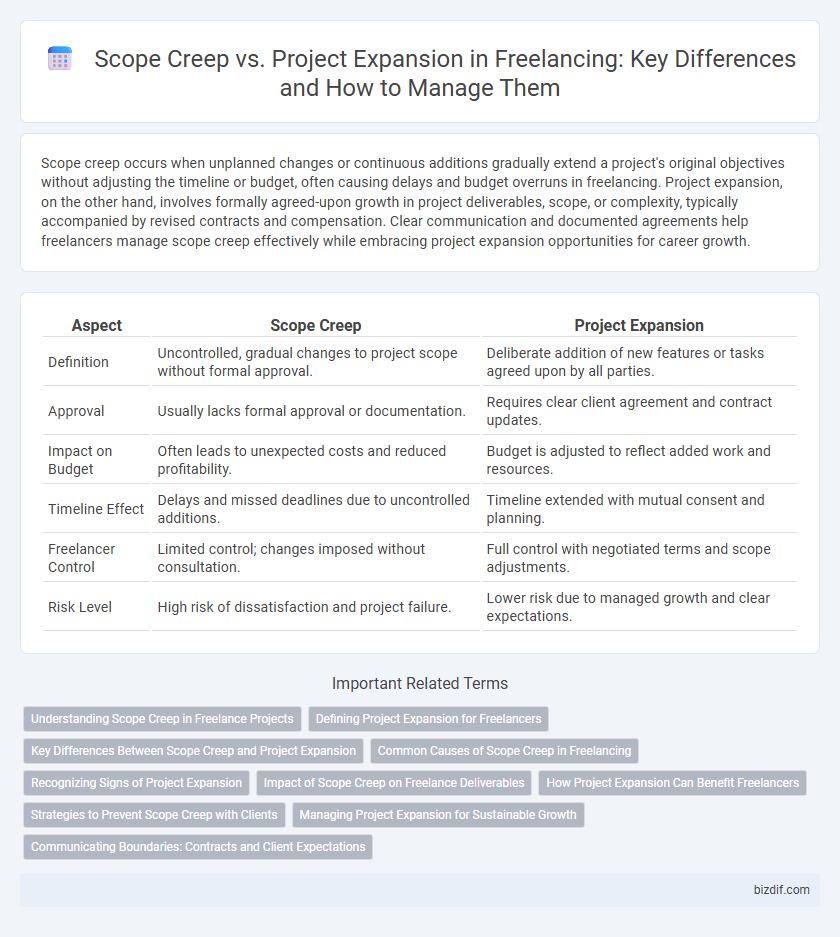Scope creep occurs when unplanned changes or continuous additions gradually extend a project's original objectives without adjusting the timeline or budget, often causing delays and budget overruns in freelancing. Project expansion, on the other hand, involves formally agreed-upon growth in project deliverables, scope, or complexity, typically accompanied by revised contracts and compensation. Clear communication and documented agreements help freelancers manage scope creep effectively while embracing project expansion opportunities for career growth.
Table of Comparison
| Aspect | Scope Creep | Project Expansion |
|---|---|---|
| Definition | Uncontrolled, gradual changes to project scope without formal approval. | Deliberate addition of new features or tasks agreed upon by all parties. |
| Approval | Usually lacks formal approval or documentation. | Requires clear client agreement and contract updates. |
| Impact on Budget | Often leads to unexpected costs and reduced profitability. | Budget is adjusted to reflect added work and resources. |
| Timeline Effect | Delays and missed deadlines due to uncontrolled additions. | Timeline extended with mutual consent and planning. |
| Freelancer Control | Limited control; changes imposed without consultation. | Full control with negotiated terms and scope adjustments. |
| Risk Level | High risk of dissatisfaction and project failure. | Lower risk due to managed growth and clear expectations. |
Understanding Scope Creep in Freelance Projects
Scope creep in freelance projects occurs when clients request additional tasks beyond the original agreement without adjusting the timeline or budget, leading to increased workload and potential burnout. It is critical for freelancers to clearly define project boundaries and deliverables in contracts to avoid misunderstandings and maintain profitability. Recognizing scope creep early enables timely communication and negotiation, preserving project quality and client relationships.
Defining Project Expansion for Freelancers
Project expansion for freelancers occurs when the original project scope evolves to include new goals or deliverables aligned with the client's strategic vision, distinct from unauthorized scope creep. Defining project expansion involves clear communication and documented agreement on additional resources, timelines, and compensation to reflect the enhanced workload. Managing project expansion effectively safeguards freelancer-client relationships and ensures fair valuation of extended services.
Key Differences Between Scope Creep and Project Expansion
Scope creep involves uncontrolled, often unauthorized changes that gradually extend a project's original objectives, leading to potential budget overruns and timeline delays. Project expansion refers to deliberate, agreed-upon additions to the project scope, usually supported by formal change requests and adjustments in resources and deadlines. Clear communication and documented agreements are essential to distinguish scope creep from project expansion and maintain project control.
Common Causes of Scope Creep in Freelancing
Common causes of scope creep in freelancing include unclear project requirements, poor communication between client and freelancer, and lack of proper documentation. Frequent client requests for additional features or changes without updated contracts lead to unmanaged workload increases. Ineffective project planning and ambiguous deliverables also contribute significantly to scope creep challenges.
Recognizing Signs of Project Expansion
Recognizing signs of project expansion involves identifying client requests that add new features or objectives beyond the original agreement while still aligning with the project's core goals. Unlike scope creep, which often occurs through unplanned or unauthorized changes, project expansion is typically a deliberate, mutually agreed-upon growth in project deliverables. Clear communication and documentation of these expansions ensure that freelancers can manage time, budget, and resources effectively without compromising project quality.
Impact of Scope Creep on Freelance Deliverables
Scope creep in freelancing leads to unplanned tasks that strain resources and delay deliverables, reducing overall project quality and client satisfaction. This phenomenon often causes freelancers to exceed initial timelines and budgets without additional compensation, impacting profitability. Clear contract boundaries and diligent project management are essential to mitigate the adverse effects of scope creep on freelance deliverables.
How Project Expansion Can Benefit Freelancers
Project expansion allows freelancers to increase their revenue by taking on additional tasks that align with their skills, enhancing client relationships and fostering long-term collaborations. Embracing project growth helps freelancers showcase versatility and adaptability, often leading to referrals and higher-value projects. Successfully managing expanded scopes strengthens a freelancer's portfolio and negotiating power for future contracts.
Strategies to Prevent Scope Creep with Clients
Scope creep occurs when project requirements gradually increase beyond the original agreement, whereas project expansion involves a negotiated and mutually agreed-upon increase in scope. To prevent scope creep, clearly define deliverables and establish detailed contracts with explicit boundaries on tasks and timelines. Regularly communicate with clients, document all changes, and implement formal change request processes to maintain project control and avoid unauthorized workload increases.
Managing Project Expansion for Sustainable Growth
Managing project expansion effectively involves setting clear boundaries and expectations with clients to prevent uncontrolled scope creep, which can lead to burnout and missed deadlines. Implementing structured change requests and regular progress reviews ensures that additional work aligns with the original project goals and budget, enabling sustainable growth for freelancers. Prioritizing transparent communication and realistic resource allocation helps maintain project quality while scaling services.
Communicating Boundaries: Contracts and Client Expectations
Clear communication of boundaries through detailed contracts and explicit client expectations minimizes scope creep in freelancing projects. Defining project deliverables, timelines, and revision limits upfront helps protect both parties from ambiguous requests that can lead to uncontrolled project expansion. Regular check-ins and documented approvals ensure alignment and prevent misunderstandings throughout the freelancing engagement.
Scope Creep vs Project Expansion Infographic

 bizdif.com
bizdif.com